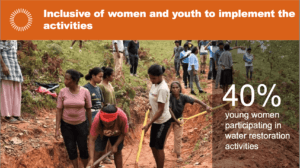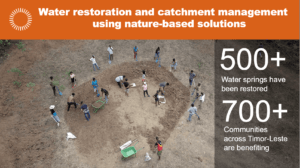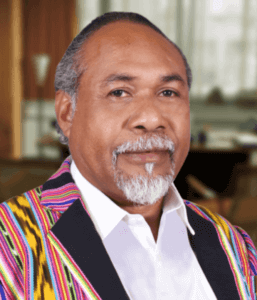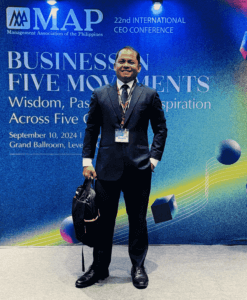I was privileged to attend the session led by Eugenio “Ego” Lemos, CEO of Permatil Global, at the 22nd MAP International CEO Conference on September 10, 2024. Ego Lemos, a well-known advocate for sustainability, discussed his youth-driven initiatives aimed at tackling environmental challenges, particularly in water preservation and sustainable development. His presentation offered valuable insights into how local communities can actively restore ecosystems, setting the stage for broader social change.
Timor-Leste, a small island nation with a population of 1.3 million, faces unique environmental and social challenges. With 70% of its population under 35 years old, the country has a significant youth demographic that holds the potential to drive sustainable development. However, the environmental context of Timor-Leste, characterized by mountainous terrain, slash-and-burn agriculture, and intensified rainfall patterns due to climate change, poses significant obstacles.
Environmental and Social Challenges
The traditional approach to Water, Sanitation, and Hygiene (WASH) in Timor-Leste has focused heavily on water infrastructure rather than the restoration of natural water springs. This has led to the drying up of many water sources, creating severe social issues. Women and children, in particular, suffer from the burden of collecting water from distant sources, often uphill and downhill, leading to poor hygiene practices and malnutrition.
Permatil’s Youth-Based Approach
Permatil Global, under the leadership of Ego Lemos, has pioneered a youth-based approach to water restoration and catchment management. Over 6,000 youth across Timor-Leste have been trained in permaculture ethics, which emphasize earth care, people care, and fair share. These young people, familiar with the local topology and ecology, are instrumental in reviving natural springs and managing water catchments. Their efforts include slowing down water flow to reduce erosion and ensuring a sustainable water supply.

Cultural Integration and Reforestation
Permatil’s approach is inclusive of women and youth, integrating cultural elements such as traditional dances and rituals into water restoration activities. This cultural approach not only fosters community engagement but also ensures the sustainability of the initiatives.
Additionally, reforestation efforts involve planting multi-functional tree species that provide food sources, improve biodiversity, offer sustainable wood fuels, and reduce land degradation, leading to more resilient forests.

Challenges and Impact
During a recent Q&A session, Ego Lemos highlighted the challenges in implementing social development policies. Established in 2001, Permatil has faced difficulties in scaling its community-based projects to a larger scale. Despite these challenges, the impact of their work is evident. Key indicators of success include a reduction in the incidence of illness and malnutrition, particularly among young people.
A Call for Government Support
Mr. Lemos emphasized the importance of government support in scaling these initiatives. He urged the government to dedicate attention and financial resources to improving water preservation and forest conservation efforts. By doing so, Timor-Leste can reverse the adverse impacts of environmental neglect and set an example for other nations facing similar challenges.

Permatil Global’s youth-based approach to water restoration and catchment management in Timor-Leste demonstrates the power of community engagement and cultural integration in driving social development. With continued support and investment, these initiatives can pave the way for growth and inclusive prosperity in Timor-Leste and beyond.
The Philippines can learn several key lessons from Ego Lemos’ approach in Timor-Leste. First, engaging youth in environmental restoration projects can harness their energy and local knowledge for sustainable development. Second, integrating cultural practices into environmental initiatives can foster community engagement and ensure long-term success. Third, focusing on natural resource restoration, such as water springs, can address critical social issues like water scarcity and malnutrition. Finally, government support and investment are crucial for scaling community-based projects to achieve broader impact.
Explore Our Sustainability Initiatives
At John Clements, we are dedicated to supporting sustainability through various initiatives that make a positive impact. Discover more in The Lookingglass!






